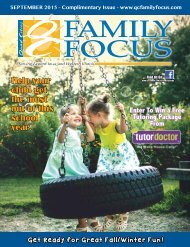QC Family Focus: November 2015
In this issue: A Teen's Perspective on Volunteering; 5 Tips for Helping Your Baby Develop; Reading with Infants and Toddlers; Text Neck: It's a Real Deal; Putnam Museum Boosts Holiday Offerings; Your Child's First Dental Appointment; Kids and Savings; The Importance of Music Education; Shoveling without Damaging Your Spine; The Facts About Fats; Senior Lifestyles; Learn more about QC Family Focus Magazine at our website: www.qcfamilyfocus.com Like us on Facebook: www.facebook.com/qcfamilyfocus
In this issue:
A Teen's Perspective on Volunteering;
5 Tips for Helping Your Baby Develop;
Reading with Infants and Toddlers;
Text Neck: It's a Real Deal;
Putnam Museum Boosts Holiday Offerings;
Your Child's First Dental Appointment;
Kids and Savings;
The Importance of Music Education;
Shoveling without Damaging Your Spine;
The Facts About Fats;
Senior Lifestyles;
Learn more about QC Family Focus Magazine at our website: www.qcfamilyfocus.com
Like us on Facebook: www.facebook.com/qcfamilyfocus
You also want an ePaper? Increase the reach of your titles
YUMPU automatically turns print PDFs into web optimized ePapers that Google loves.
Kelly Jacobsen<br />
LSI, <strong>Family</strong> Intake Assessment Worker<br />
8 <strong>November</strong> <strong>2015</strong> - <strong>QC</strong> <strong>Family</strong> <strong>Focus</strong><br />
5 Simple Tips For Helping<br />
Your Baby Develop<br />
Did you know you are your child’s first and best teacher? Even simple things like singing a song,<br />
cuddling or reading a book can help nurture your baby’s healthy growth and development. Here are five<br />
activities you can do to help your baby’s<br />
progress:<br />
1. Talk to your baby. You are<br />
your child’s greatest exposure to language<br />
acquisition. Narrating your day can help<br />
your baby begin building vocabulary.<br />
Tell your baby when you are going to<br />
do something, like “We are going to get<br />
dressed now.” You can also describe what<br />
your baby is doing. For example, you can<br />
say, “I see you smiling.” Talking with your<br />
baby can be a simple and easy part of your<br />
routine, such as singing a song during a<br />
diaper change. <br />
2. Read to your baby. Even reading<br />
a book just several times a week can<br />
improve your baby’s vocabulary. Choose<br />
board books with colorful pictures, soft<br />
textures or simple words and rhymes. With<br />
your baby in your lap, enjoy some together<br />
time with a favorite book. <br />
3. Introduce your baby to herself.<br />
Use a mirror to point out your baby’s nose,<br />
ears, eyes and mouth. Babies love seeing<br />
themselves, and it will help your baby<br />
begin to label the world around her. She’ll<br />
also learn to focus and track images. <br />
4. Find simple toys around the<br />
house. Banging on a pot with a wooden<br />
spoon or knocking down a tower of plastic<br />
food storage containers can be a big hit for a<br />
baby and help him or her build basic motor<br />
skills.<br />
5. Change your baby’s view. Offer<br />
your baby new and interesting things he or<br />
she can look at with you. Carry your baby<br />
around the room and point out pictures or<br />
objects.
















